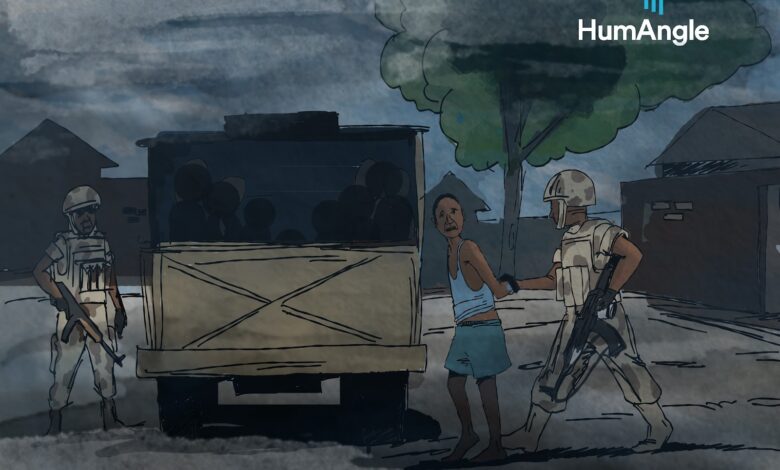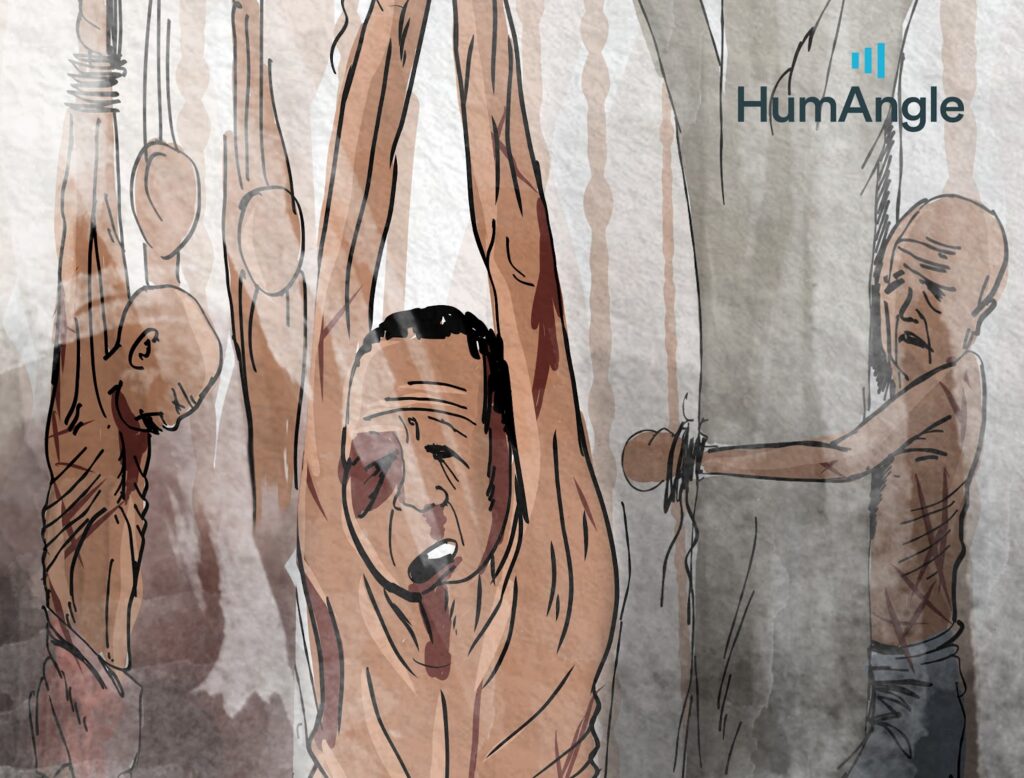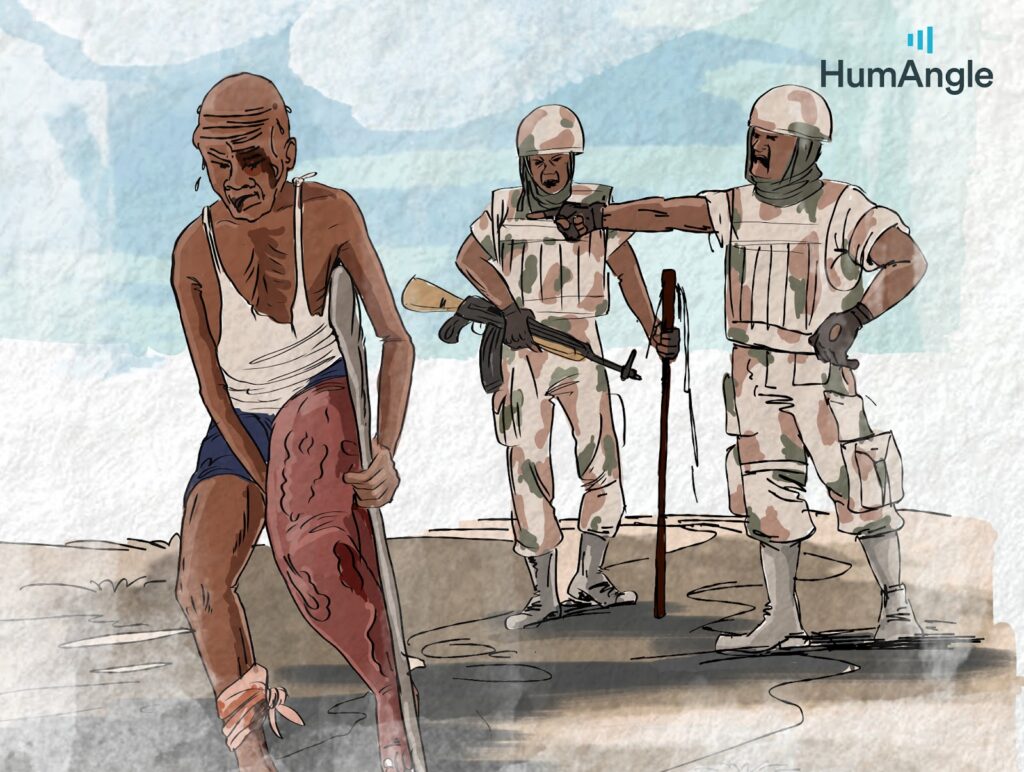Boko Haram: Ex-Detainee Recounts Horrific Torture, Deaths In Giwa Barracks
Arrested for allegedly having a connection with Boko Haram, he now narrates how soldiers breached the rights of citizens picked up in similar circumstances as well as how they exploited and tortured them to death in Northeast Nigeria.

Apart from those who stood guard over the city, almost everyone had retired to their beds as the sky laid its blanket of darkness over the troubled Borno State in Northeast Nigeria. It was 1 a.m. on Nov. 20, 2013, and, as usual, Adamu Musa, 43, was in his bed, watching over his pregnant wife.
Sahadatu had been pregnant for eight months and the couple had just finished talking about the day they would safely have the delivery of their twin. Soon, a loud screeching noise erupted into the crisp night air. The couple woke up swiftly and sat upright in their bed with their eyes widely opened.
“Who are they?” Sahadatu asked her husband. “Wait let me check,” Adamu responded as he leapt out of the bed. By the time he got to the living room to confirm the situation, some soldiers had broken into his house, chanting, “He is the one. Arrest him.”
The night raid
Though a mechanic working and living in the Gomari airport area of Maiduguri, Borno’s capital, Adamu was arrested in the wee hours by military personnel searching for Boko Haram members.
Borno State is the epicentre of the insurgency, hosting about half of the approximately 3.2 million displaced people across Nigeria. In the months and years after the violence erupted, there were frequent arrests of people faintly suspected to have affiliations with the terror group and many people were indefinitely detained or extrajudicially killed.
Adamu is one of the victims of the military’s highhanded approach. “The soldiers came with more than 10 vehicles and were arresting people randomly. They broke my door and started hitting my head when they entered. They didn’t tell me the crime I committed but threatened to kill me,” he said.
“I was arrested alongside three neighbours including Alhaji Modu Ibrahim and Alhaji Bana who were siblings. They also took a friend, Muhammed, and they handcuffed us together.”
The soldiers later drove them to Giwa army barracks, a facility infamous for the torture of “Boko Haram suspects” and where they are detained indefinitely under inhumane conditions and prevented from communicating with relatives or lawyers.
Torture, deaths
HumAngle has extensively documented the experiences of civilians who survived torture in different military barracks and the Borno Maximum Security Prison. Most of them, held alongside terror suspects without concrete evidence. Many have also lost their lives in illegal detention as a result of hunger, thirst, torture, asphyxiation, and disease.
Narrating his experience, Adamu said he was tortured from the military vehicle till they got to the detention centre. “The soldiers didn’t tell us why we were arrested until the following day. They said we are Boko Haram members,” he narrated.
“I realised that there were hundreds of people detained in the barracks. They claimed we were all terrorists and were treating us as such. They tortured us recklessly and caused us a lot of physical injuries. Even though I denied my involvement with the terrorists, they kept torturing me. For them, everybody in the barracks was a Boko Haram member. They didn’t allow us to see our family members or even lawyers. They never spoke about the court or anything within the legal frame.”

Two weeks after repeated torture and brutality, Bana, who was arrested alongside Adamu, died, and the soldiers allegedly buried him without informing his relatives. The slain civilian was a medical doctor accused by the military of treating Boko Haram members.
“The soldiers said Bana was using his house as a medical centre where injured terrorists were being treated. Even when we complained of decongestion, they looked away, saying we were yet to touch the ceiling,” Musa told HumAngle.
Journey to freedom
Unlike others who spent years in detention, Adamu was quite lucky because his father is a retired soldier. He also has a friend in the military. Efforts by these two individuals made the soldiers release him on Dec. 22, 2013, about a month into his arrest.
“I knew my soldier-friend after I helped him repair his vehicle and my father is also an old soldier. My father came to the barracks on several occasions but military authorities insisted that I was working for terrorists. It took the intervention of my friend and my father’s friend for me to be released.”
Adamu told HumAngle a soldier gave him ₦200 as transportation fare after his release but he could not walk for long before collapsing. He told our reporter that the soldiers had broken his leg while in jail.
“It was a passer-by that lifted me up outside the gate of the barracks and took me home. It was at that point I realised the damage done to my leg. I got home to hear that my wife already had a miscarriage as a result of depression. She later died and we grieved for days. I was seriously sick and needed medical attention for my injury.”

Adamu told HumAngle he could not work for a year as he had to frequent the hospital to treat his leg. His eight children survived on donations from friends and relatives.
‘How my friend was killed’
According to Amnesty International, those who died at Giwa barracks alone between 2011 and 2020 could be up to 10,000. In March 2014, Boko Haram insurgents breached the facility, freeing hundreds of other members of the sect who had been held there as part of the government’s efforts to stamp out the insurgency.
The controversial operation led to the killing of many suspected ex-detainees by soldiers who claimed they were preventing the attackers from re-absorbing their fellow sect members.
“It was during the operation that Alhaji Modu Ibrahim escaped from the detention and he broke the news that Muhammed, the fourth person arrested with us during the midnight raid, was shot while trying to escape,” he narrated.
Adamu and Ibrahim who survived the illegal arrest and detention have, however, left Maiduguri to battle for survival elsewhere.
“We left Maiduguri because we could no longer walk freely on the street when we returned from prison. I am scared they may arrest me again. We suffered and could not get justice. Innocent people got their lives truncated because no one cares. I don’t even know where Alhaji Ibrahim stays now.”
Adamu now squats with a friend in the Federal Capital Territory (FCT) Abuja. He is searching for a job so he can start a new life and take care of his children who are also struggling to survive in Maiduguri.
This report is a partnership between the African Transitional Justice Legacy Fund (ATJLF) and HumAngle Media under the ‘Mediating Transitional Justice Efforts in North-East’ project.
Support Our Journalism
There are millions of ordinary people affected by conflict in Africa whose stories are missing in the mainstream media. HumAngle is determined to tell those challenging and under-reported stories, hoping that the people impacted by these conflicts will find the safety and security they deserve.
To ensure that we continue to provide public service coverage, we have a small favour to ask you. We want you to be part of our journalistic endeavour by contributing a token to us.
Your donation will further promote a robust, free, and independent media.
Donate HereStay Closer To The Stories That Matter




